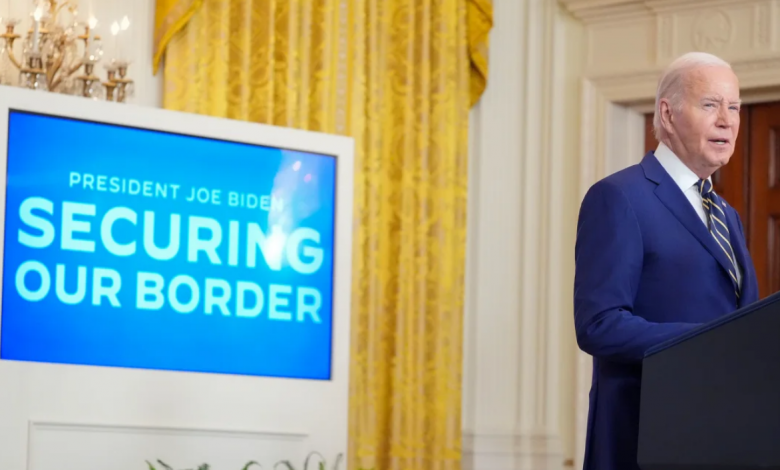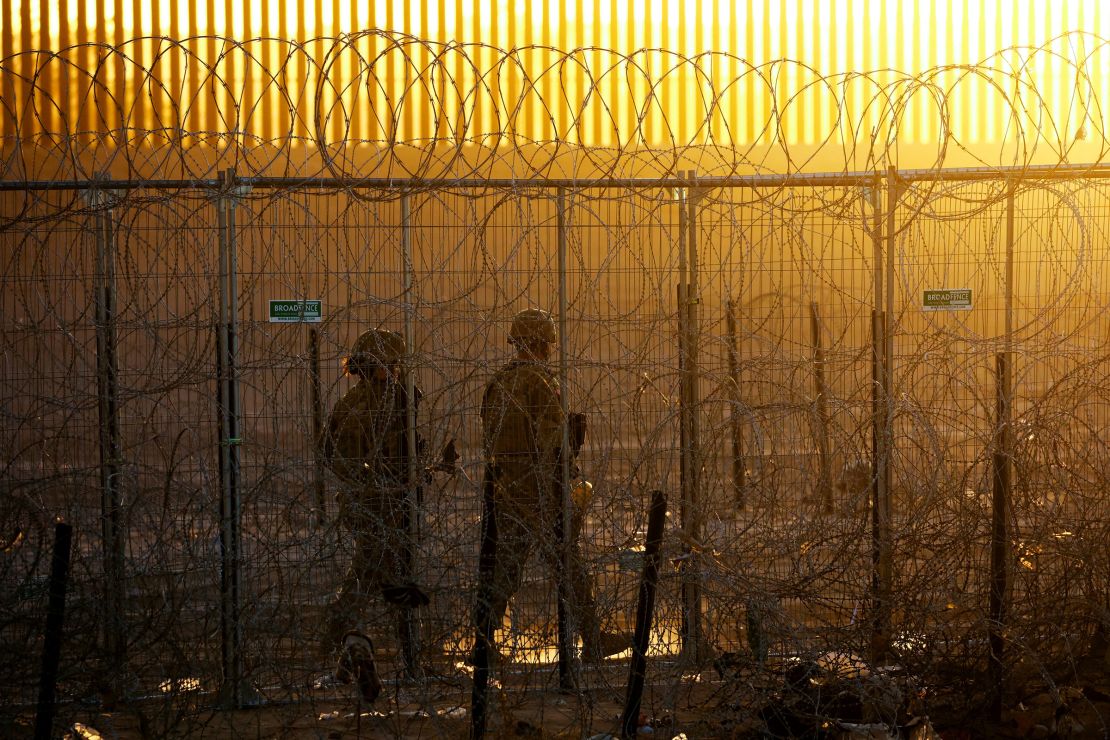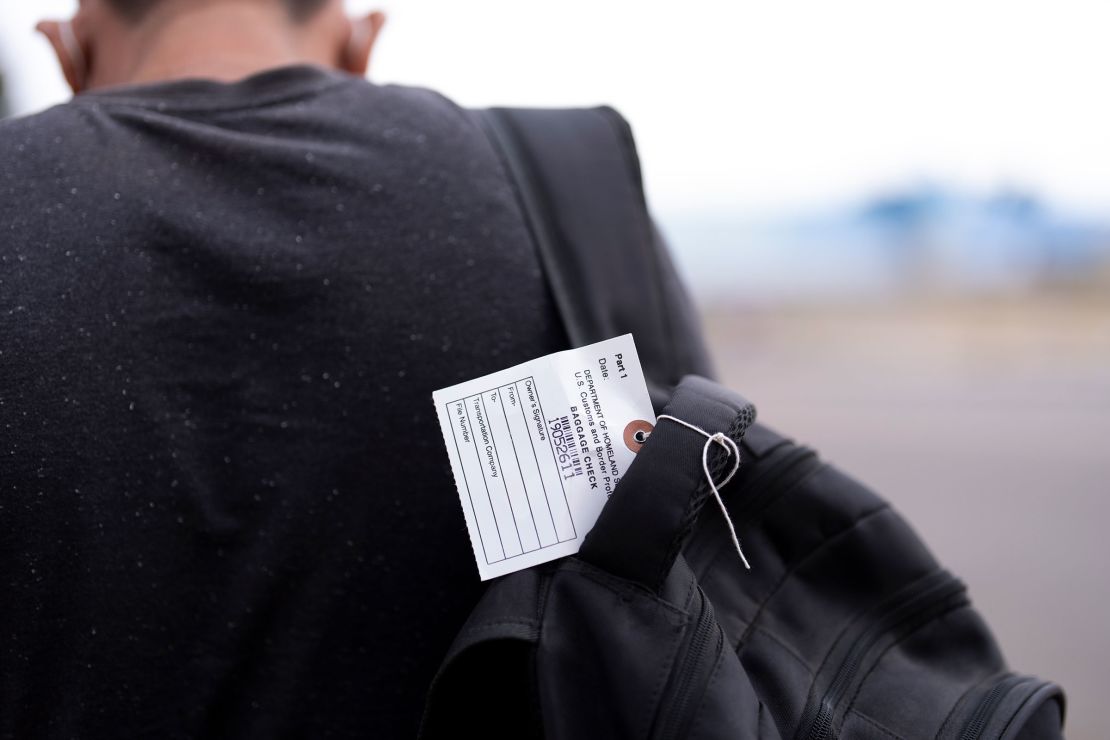
The Biden administration is quickly invoking an authority to shut off access to asylum for migrants who cross the US-Mexico border illegally, a significant attempt by President Joe Biden to address head on one of his biggest political vulnerabilities.
Biden unveiled the sweeping executive action Tuesday afternoon at the White House, attempting to use executive action to affect the situation on the border after a bipartisan measure failed earlier this year. The action marks the administration’s most dramatic move on the US southern border as Biden tries to gain the upper hand on immigration just weeks from the first presidential debate – by using the same authority former President Donald Trump tried to use in office.
The White House announced the action would take effect at midnight.
In a speech at the White House, Biden said Republicans in Congress who blocked a bipartisan border deal left him no choice but to take executive action.
“I’m moving past Republican obstruction and using the executive authorities available to me as president to do what I can on my own to address the border,” Biden said.
The new executive action bars migrants who cross the border illegally from seeking asylum – a departure from decades-long protocol – once a daily threshold is met. Unless they meet certain exemptions, migrants will be turned away to Mexico or returned to their origin country.
Ad Feedback
Border authorities encountered around 3,500 migrants crossing the border unlawfully on Monday, according to a Homeland Security official, above the threshold needed for the executive action to take effect.

Members of the Texas National Guard stand guard near a razor wire fence to inhibit the crossing of migrants into the United States, seen from Ciudad Juarez, Mexico, on June 4. Jose Luis Gonzalez/Reuters
Homeland Security officials have recently been arresting just under 4,000 migrants daily at the US-Mexico border, a brief reprieve from record numbers late last year. The number of people crossing the US southern border has consistently been a challenge for the Biden administration as officials grapple with record migration across the Western Hemisphere.
The measure could be turned on and off. Senior administration officials told reporters Tuesday it would be lifted when there’s a daily average of less than 1,500 encounters in between ports of entry.
Unaccompanied children, victims of a severe form of trafficking, those who present an acute medical emergency or an imminent and extreme threat to life and safety – among select others – are exempt. Migrants can also still request an appointment through the Customs and Border Protection mobile application, known as CBP One, to present their asylum claim at a port of entry.
Biden and his administration made clear that they would have rather had bipartisan legislation to sign that addressed the crisis at the border.
“Frankly, I would have preferred to address this issue through bipartisan legislation because that’s the only way to actually get the kind of system we have now that’s broken, fixed. To hire more Border Patrol agents, more asylum officers, more judges. But Republicans have left me no choice,” Biden said in the speech from the East Room of the White House.
Critics have blasted the move as akin to steps taken under Trump. As a candidate, Biden blasted the Trump administration as “inhumane” on the border. On a call with reporters Tuesday previewing the new action, one official defended the steps as separate and apart from Trump’s, while acknowledging they’re prepared for legal challenges, “frankly, from both sides of the political spectrum.”

A migrant seeking asylum carries a backpack with a tag as he looks for transportation options after being processed and released, Tuesday, June 4, in San Diego. Gregory Bull/AP
“The Trump administration attacked almost every facet of the immigration system, and did so in a shameful and inhumane way,” one official said Tuesday. “The action will not ban people based on their religion, it will not separate kids from their mothers. There’re also narrow humanitarian exceptions to the bar on asylum, including for those facing an acute medical emergency or an imminent and extreme threat to life or safety – the Trump administration’s actions did not include these exceptions.”
The president responded to criticism from progressives and others who have likened the move as similar to steps taken under Trump.
“For those who say the steps I’ve taken are too strict, I say to you that be patient and the good will of the American people is wearing thin right now. Doing nothing is not an option. We have to act. We must act consistent with both our law and our values. Our values as Americans. I take these steps today, not to walk away from who we are as Americans, to make sure we preserve who we are for future generations to come,” he said.
Biden also directly repudiated the former president.
“I will never demonize immigrants, I will never refer to immigrants as poisoning the blood of a country. And further I’ll never separate children from their families at the border. I will not ban people from this country because of their religious beliefs. I will not use the US military to go into neighborhoods all across the country to pull millions of people out of their homes and away from their families, to put detention camps while awaiting deportation, as my predecessor says he’ll do if he occupies this office again,” Biden said.
Senior administration officials acknowledged that federal resources are strained, which could pose a challenge, but they maintain that the measure will help them remove people more quickly. Migrants who don’t claim a fear may be removed within days or hours, while those that do will be screened and, if found ineligible, removed.
Homeland Security officials have been preparing for an anticipated rise in border crossings, consistent with previous years when numbers tick up in the summer, including shifting resources to meet a potential surge and getting personnel in place. Senior administration officials Tuesday cited the measure as a tool to help head off that potential increase.
The action also relies heavily on cooperation from Mexico, who previously agreed to accept up to 30,000 migrants per month from Cuba, Haiti, Nicaragua and Venezuela as part of an effort to cut down on illegal migration in the hemisphere and has significantly ramped up immigration enforcement as part of ongoing efforts.
Officials declined to say Tuesday if any new agreement had been reached with Mexico around Tuesday’s executive action.








